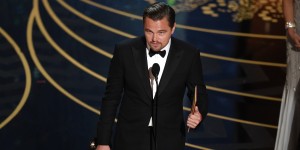If you’ve stumbled across any website like Tumblr, 4chan, or even Facebook in the last 5 years, I’m sure you’ve head- Leonardo DiCaprio was Oscar-less. Shocking news to anyone who watched eagerly as he portrayed rolls from a Wall Street Banker to my personal favorite interpretation of Shakespeare’s Romeo.

Leo is known for more than just his extraordinary acting these days, however. He is one of the most famous, and most vocal, proponents for climate change legislation and recognition. When he finally did win his Best Actor Oscar last month, he used the international platform it provided, with 34.4 million viewers, to promote collective action to mitigate the effects of climate change (full transcript here).
Leo’s speech touched on many aspects of the Anthropocene that we have discussed in class. His first sentence, as he shifts from thanking his friends and coworkers to his environmentalist message, ties his message to his award-winning film, “And lastly, I just want to say this: Making The Revenant was about man’s relationship to the natural world”. The Revenant, set in the 1820’s, perfectly shows how we as a species have shifted from the natural environment shaping us (the routes the characters traverse, what they eat, when they can travel- all determined by “the natural world”), to us shaping it in 2016 (hence the name and definition of the Anthropocene). He uses scientific facts and an example of the impact he felt that could easily be found in the pages of Schwägerl, “ A world that we collectively felt in 2015 as the hottest year in recorded history. Our production needed to move to the southern tip of this planet just to be able to find snow.” He speaks to the political theories of democracy and collectivism by saying, “we need to support leaders around the world who do not speak for the big polluters, but who speak for all of humanity… for those people out there whose voices have been drowned out by the politics of greed”. Lastly, he unintentionally points out one of the main criticisms behind naming this time “the Anthropocene”, as certain people are very responsible for the current climate, while “billions and billions of underprivileged people out there [will] be most affected by this”.

As millions of people watched this speech, the question still remains- will people remember DiCaprio’s call to action, or just Heidi Klum’s dress? The Donella Meadows reading on systems theory points out that a strong leverage point is changing the structure of information flows, delivering information to places where is previously wasn’t going. While there isn’t much data on the overlap of scholarly climate science article subscribers and Oscar viewers, Leo’s speech likely reached thousands, if not millions, of people who were not previously seeking this information actively. Celebrity advocacy has been a rising trend for many causes (as seen in the other speeches and performances of The Oscars), including environmentalism in recent years, so it is difficult to gauge if DiCaprio truly changed the flow of information.
However, if all of his fans put as much passion and effort into environmentalism as they did attention to his whereabouts, girlfriends, and award-show loses- perhaps the Anthropocene could have a slightly better outcome.

I’m glad you brought this up! I was impressed by his insistence on bringing this issue to light on such a large scale, especially when it is his time to enjoy his achievement (finally). I was also pleased to discover, when I did some snooping into facts about The Revenant, that the entire movie was attempted to be used as a platform to promote awareness about climate change and our disconnect with nature. It is unclear if these instances will make an impact, but this “trend” of activism at least suggests that the concern is increasingly popular.